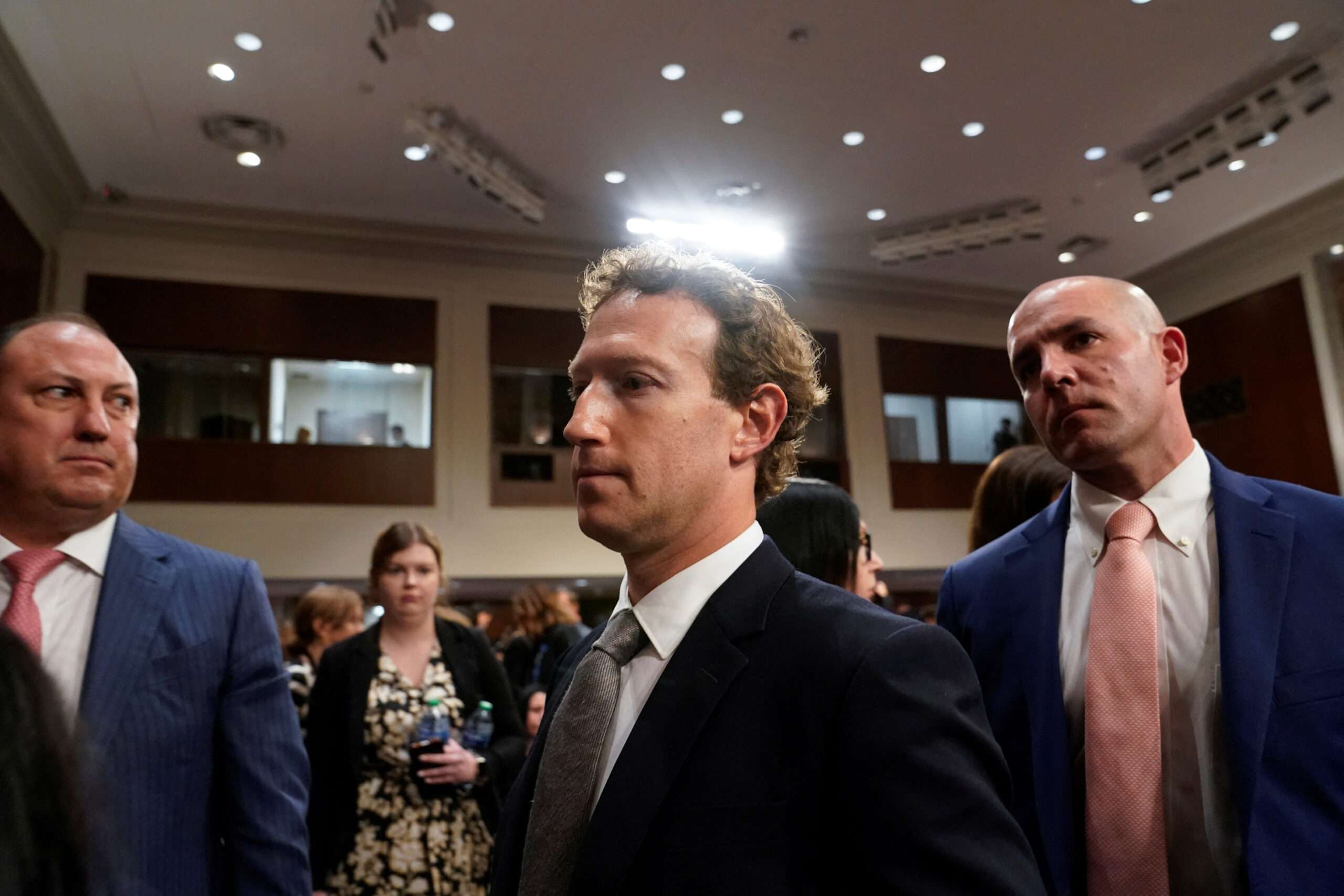Image Courtesy – Reuters
Earlier today, Chief Executive Mark Zuckerberg offered an apology during a U.S. Senate hearing regarding the impact of social media on children. Prompted by Republican Senator Josh Hawley, Zuckerberg stood and directly addressed families who displayed pictures of their children, claiming harm caused by social media.
During the live broadcast, Hawley asked Zuckerberg, “Would you like now to apologize to the victims who have been harmed by your product?” In response, Zuckerberg stood, turned to the families, and expressed regret: “I’m sorry for everything you have all been through. No one should endure the hardships that your families have faced. This is why we invest significantly, and we will persist in industry-wide efforts to ensure that no one has to undergo the challenges your families have experienced.”
As per Statista’s projections, the anticipated social media advertising expenditure in the United States is set to surpass $94.4 billion in 2023, with social media spending constituting one-third of overall advertising expenses. The forecast indicates a substantial increase, with the projected expenditure soaring to an impressive $122.2 billion by 2026.
This upward trend is substantiated by the continuous growth in the number of social media users. Predictions indicate that by 2027, the global count of social media users is expected to approach nearly 6 billion individuals. This surge in user engagement serves as a compelling rationale behind the escalating investment in social media advertising, reflecting the platform’s pervasive reach and influence in contemporary communication and marketing landscapes.
Transformational impacts on child and adult psychology
Though this is over-spoken and under worked on subject matter, the economic and social impacts are becoming clearer.
Engaging with social media profoundly alters our interactions with others, exerting a substantial influence on the fabric of our social experiences. The impact extends beyond mere connectivity, encompassing the realms of social inclusion and exclusion, pivotal elements that significantly shape human development, particularly in the realm of mental health.
The use of social media has emerged as a pivotal factor in shaping social dynamics, as individuals navigate the intricate web of virtual connections. It plays a dual role, acting as a facilitator of social inclusion by fostering connections and relationships but also serving as a potential catalyst for exclusion, contributing to the complex landscape of interpersonal relationships.
In the context of human development, particularly mental health, social inclusion nurtures a sense of belonging and community, fostering positive psychological well-being. Conversely, experiences of exclusion, often exacerbated by social media dynamics, can lead to feelings of isolation, loneliness, and adverse mental health outcomes. The constant exposure to curated representations of others’ lives on social platforms may contribute to unrealistic expectations, social comparison, and a sense of inadequacy, further impacting individuals’ mental and emotional well-being.
In this intricate interplay between social media and human experience, recognizing the profound implications on social inclusion and exclusion becomes paramount. Acknowledging these complexities underscores the need for nuanced discussions and comprehensive strategies to harness the positive potential of social media while mitigating its adverse effects on mental health and overall human development.
How is social media affecting elections?
Social media serves as a powerful tool for disseminating information rapidly. Political candidates utilize these platforms to share their policies, agendas, and campaign updates directly with the public. This direct communication allows for unprecedented access to candidates, fostering a sense of transparency and engagement.
However, the ease with which information is spread on social media also contributes to political polarization. Algorithms often tailor content to users’ preferences, creating echo chambers where individuals are exposed to information that aligns with their existing beliefs. This polarization can intensify during election periods, leading to heightened political divisiveness.
One of the most significant challenges posed by social media in elections is the proliferation of fake news and misinformation. Malicious actors exploit the platforms to spread false narratives, influence public opinion, and even interfere with electoral processes. Governments and tech companies grapple with addressing this issue, implementing measures to identify and curb the spread of misleading information.
Social media platforms enable highly targeted advertising, allowing political campaigns to tailor their messages to specific demographics. While this can enhance campaign efficiency, it also raises concerns about the potential manipulation of voter sentiment through micro-targeting and personalized content.
Social media has become a catalyst for online activism and political mobilization. Movements and grassroots campaigns can quickly gain momentum through hashtags, viral content, and digital organizing. This newfound ability to mobilize voters on a large scale has reshaped the dynamics of political participation.
How bad is the situation for developing countries?
Social media’s impact on developing countries is a multifaceted phenomenon, marked by a complex interplay of positive and negative consequences that extend across various facets of society. The transformative power of social media is undeniable, yet it brings with it challenges that, if unaddressed, can exacerbate existing disparities and vulnerabilities.
One prominent concern is the widening digital divide, a consequence of uneven access to digital technologies. In developing countries, disparities between urban and rural areas, as well as among different socio-economic groups, can be amplified by the penetration of social media. This disparity limits marginalized communities’ access to crucial information, economic opportunities, and participation in public discourse, hindering their overall development.
Additionally, the proliferation of misinformation and fake news on social media platforms poses a significant challenge for developing countries. Lower levels of media literacy and education make these nations more susceptible to the spread of false narratives. The impact extends beyond shaping public opinion, affecting political stability and even public health initiatives, as inaccurate information gains traction.
The potential for political manipulation further complicates the scenario. Social media platforms can be exploited for disinformation campaigns by foreign entities or internal actors seeking to influence elections or manipulate public sentiment. This manipulation not only undermines the democratic process but also contributes to political instability and erodes public trust.
The rapid dissemination of information on social media, while a powerful tool for organizing social movements, also poses risks for developing countries. Incidents or rumors can escalate quickly, leading to social unrest, protests, or conflicts. Striking a balance between the positive aspects of social media as a tool for social mobilization and its potential to spread false information and incite violence is crucial.
The anonymity provided by social media contributes to cyberbullying and online harassment, issues that are particularly challenging in developing countries where comprehensive legal frameworks and support systems may be lacking. Privacy concerns arise from the data collection practices of social media platforms, raising worries about surveillance, identity theft, and the misuse of personal information.
Cultural erosion is another consequence, as the global nature of social media tends to overshadow local traditions and languages with Western-centric content. This homogenization threatens cultural diversity, leading to the potential loss of indigenous knowledge and values.
Economic disparities are also heightened by social media, despite its potential for offering economic opportunities through online entrepreneurship. Access to technology and digital skills becomes a determinant factor, with those lacking such access facing exclusion from the economic benefits that social media can bring.
In addressing these challenges, a collaborative effort involving policymakers, civil society, and technology companies becomes imperative. Promoting digital literacy is crucial for empowering individuals to navigate the online environment effectively. Establishing robust regulatory frameworks helps in curbing the negative consequences of social media, from misinformation to privacy breaches. Moreover, fostering inclusive access to technology ensures that the benefits of social media are equitably distributed, contributing to the overall development and well-being of societies in the developing world.






